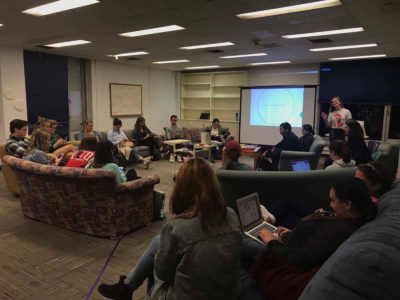
In light of the recent non-renewal of the Children’s Health Insurance Program and failed attempts to repeal the Affordable Care Act that would leave up to 32 million more Americans uninsured, three Boston University students created an event to encourage discussions about health care.
The Empowerment League, a group working in conjunction with the BU Community Service Center, addresses human rights issues in several programs. The group sponsored their first ever Empower Hour event, “Healthcare as a Human Right,” on Monday evening in the CSC. They collaborated with Project Hope, a student network that focuses on public health.
Empowerment League managers Hailey Branchford, a School of Engineering senior, and Olivia McKellar, a School of Education junior, collaborated with Lauren Sayah, a Sargent College of Health and Rehabilitation Sciences senior and manager of Project Hope, to facilitate the event.
The trio gave a brief presentation about health care in the United States, then invited attendees to share their thoughts and experiences on the matter. In a circle of sofas and chairs, students discussed concerns over government healthcare programs becoming incentives for individuals to remain unemployed.
Madison Tyler, a College of Arts and Sciences freshman, disagreed with the belief that individuals who seek government support for healthcare should remain unemployed. Tyler’s father has Type 1 diabetes, she said, and his medications are covered through his company’s insurance. If her family did not have the same coverage, they would have to make many sacrifices.
“I don’t think that’s an accurate argument because it [medical expenses] does bankrupt people that do work,” Tyler said. “We’re lucky enough to have insurance. [Without it] I wouldn’t be able to go to college.”
She said she believes that informing others about health care and about people living with chronic illnesses can counter this harmful stigma.
“Some people that are able-bodied and have their health don’t realize the importance of having a universal system unless they actually see the effects, and it’s interesting as well that it can happen to someone you’re sitting next to,” Tyler said.
Students also talked about the impacts that identity has on medical treatment after reading an article from Stat News, a national publication focused on telling stories about health and medicine. The article focused on a black female sickle-cell patient who struggled to obtain medicine in the ER due to worries about opioid abuse.
The topic of the tradeoffs that people of lower socioeconomic classes make was discussed. At one point, Branchford mentioned that people with lower incomes may avoid medical treatment when ill in order to avoid the costs.
According to the facilitators, they hope to host another discussion about human rights on Oct. 23, but the topic will be mass incarceration. They said they want these discussions to attract people both already interested in the topics and those without previous knowledge. They also said they planned to make Empower Hour a monthly series.
“We want these talks to be for people both with experience and without experience, so taking these big topics and presenting them in a digestible manner,” McKellar said.
The Empowerment League offers a multitude of volunteer opportunities, but hosting discussions is a new territory for them.
“It’s something that we decided was missing within our program — especially bringing people into the center who perhaps maybe have never been,” Branchford said.
They have programs to help people who learned English as a second language, those who are incarcerated, immigrants and refugees. According to their website, volunteers are placed at sites such as the International Institute of New England, Boston Education, Skills and Training Corporation and BU’s Center for English Language and Orientation Programs.
Branchford and McKellar want to unite the league’s volunteers at the talks and expand the league to be more than a community service program. Sayah said she believes discussions like Empower Hour can engage volunteers in a new way.
“For me, it’s all about understanding that volunteering can go so much farther and that there’s a reason that these community partners exist and what these volunteers can do besides volunteering a few hours a week,” Sayah said.
In the future, the Empowerment League wants to leave a lasting impact on the BU and Boston community.
Branchford said, “Sustained impact is what I think we were all working on, and we’re hoping this [Empower Hour talks] is a step in that direction.”
























































































































